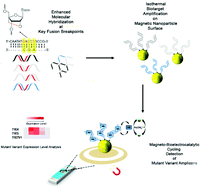Molecular locker probe enrichment of gene fusion variants from matched patient liquid biopsy specimens for magneto-bioelectrocatalytic nanosensing†
Abstract
The accurate and sensitive analysis of recurrent gene fusion mutant variants in circulating tumor nucleic acids (NAs) of patient liquid biopsy samples is crucial for realizing clinical potential for cancer screening, diagnostics, and therapeutics. Gene fusion analysis is especially challenging in patient liquid biopsy samples because of trace biotarget levels in high non-target background of highly similar native and variant NA sequences. Herein, we describe accurate analysis of three prostate cancer gene fusion mutant variants in matched plasma and urine specimens from real cancer patients and healthy controls (n = 80) by (i) direct locker probe enrichment of multiple gene fusion mutant variants without tedious upstream sample processing; (ii) magneto-bioelectrocatalytic cycling readout using both NA-intercalating and freely diffusive redox probes for superior signal enhancement. For each mutant variant, an ultrabroad dynamic range (10–105 copies) was achieved with enhanced 10 copies (zmol) detection limit. With the combination of locker probe enrichment and magneto-bioelectrocatalytic cycling readout for NA mutant variant analysis, the potential of non-invasive liquid biopsies may be exploited for the benefit of cancer patients.



 Please wait while we load your content...
Please wait while we load your content...